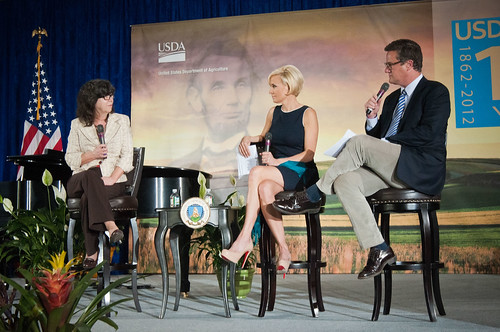
It’s hard to believe it’s been nearly seven years since the lives of the citizens of New Orleans and surrounding areas of the Gulf Coast were changed forever in the wake of Hurricane Katrina. This epic storm demanded an immediate and unprecedented response. I was proud to be part of USDA’s team that quickly mobilized to provide disaster food assistance.
Millions of people in the Gulf area needed food, and with charitable organizations setting up mass feeding sites to serve evacuees, there was a huge need for commodities. USDA provided 22 million pounds of food, such as fruits, juices, vegetables, meats and grains, as well as infant formula and baby food, for use in congregate meal service and distribution of household food packages until the Disaster Food Stamp Program (now Disaster SNAP) became operational.
USDA quickly approved over 70 waivers that enabled affected States, including Alabama, Florida, Louisiana, Mississippi and Texas, to operate Disaster Food Stamp Programs for storm survivors. Disaster Food Stamp Programs usually provide a single month of benefits to needy survivors, but the need was so great and the damage so widespread that survivors from large areas of Louisiana and Mississippi received a second or even a third monthly benefit.
There was another twist in getting Disaster Food Stamp benefits to those in need – many people had fled the Gulf area and taken refuge in other parts of the country—survivors travelled to all parts of the country, from the east coast to the west and all points in between. So, for the first time, the Food and Nutrition Service (FNS) established an evacuee policy which authorized other States to immediately serve people who had fled the Gulf, some of whom had no belongings or documents. In all, over 1.4 million households received more than $680 million in Disaster Food Stamp benefits.
We also granted waivers to schools outside of the devastated areas, allowing them to provide free school meals to children who had fled the impacted areas and had begun attending classes elsewhere.
I can’t tell you how many FNS staff spent week after week on the road or on conference calls to ensure that our programs were responding to the needs of survivors. But I can definitely tell you that every one of them wanted to be a part of the response in any and every way they could. Again, I’m proud to have been a part of such an effort.
USDA was one of few Departments to be recognized by the White House for its efforts in “what went right prior to and in the devastating aftermath of Hurricane Katrina.”
More important than any recognition, however, was making a difference in the lives of those effected by this historic disaster. And beyond the immediate response, the Katrina experience prepared us to better serve countless other survivors of natural disasters that have occurred in the years since.


